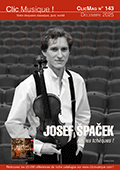|
|
|
Format : 1 CD
Total Time : 01:05:39
Recording : 2014
Location : Jerusalem/Tel Aviv/Worcester
Country : Israël/Etats-Unis
Sound : Stereo
Label : New World
Catalog No. : NW80764
EAN : 0093228076421
Price Code : DM020A
Publishing Year : 2015
Release Date : 01/01/2015
Genre : Classical
|
|
 |
Vittorio Rieti (1898-1994)
Triptyque pour deux clavecins
Concertino pour cinq instruments
Sonate brève pour violon et clavecin
Pastorale et fughetta pour flûte, alto et clavecin
Sonate All'Antica
Variations sur deux Cantigas de Santa Maria
Marina Minkin, clavecin
Mark Kroll, clavecin
Carol Lieberman, violon
Moshe Epstein, flûte
Zvi Carmeli, alto
Ella Toovy, violoncelle
Yael Zamir, hautbois
Richard Paley, basson
Julia Rovinsky, harpe
|
 
 The desire to compose modern music inspired by or in imitation of the baroque and classical styles was adopted by many composers in the first half of the twentieth century. Vittorio Rieti (1898 - 1994), who probably absorbed neo-classicism from Stravinsky in Paris, embraced it with all the passion of his youth and of the period, but unlike his contemporaries, Rieti never let go of it. He continued to write in this mode throughout his life, long after most composers had abandoned or transformed the style. As Rieti himself remarked in 1973, "I maintain the same aesthetic assumptions I have always had. I have kept evolving in the sense that one keeps on perfecting the same ground." The harpsichord, moreover, was perhaps the ideal instrument with which to invoke the neo-classical sound. Stravinsky's decision to give the instrument a prominent role in his last neo-classical work, The Rake's Progress, makes the connection to Mozart's operas all the more apparent. Rieti never lost his fondness for the harpsichord. If anything he became more enamored of it, and as his affection increased so did his skill in writing for it. Six of his eight compositions for the instrument appear on this recording, spanning the entirety of his compositional life: one of the earliest, the Sonata all'Antica (1946); three pieces from the 1960s - the Concertino for Flute, Viola, Cello, Harp and Harpsichord (1963), the Pastorale e Fughetta for Flute, Viola and Harpsichord (1966), and the Sonata Breve for Violin and Harpsichord (1967); and his last two compositions for harpsichord, written when he was in his eighties: the Variations on Two Cantigas de Santa Maria (1978), and the Triptych for Two Harpsichords (1982). Rieti left a lasting legacy of harpsichord music and other works in his very personal style, which was eloquently described by his old teacher Alfredo Casella: "Rieti's oeuvre stands apart in its specific clarity, gaiety and sophistication of a kind only he possesses, yet it hides a good deal of melancholy."
 |
| . |
 |
|
|
